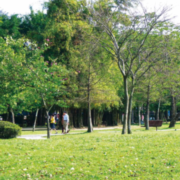Nudge and budge your citizens to reduce demand on hard pressed council services
New research from two leading local government think tanks has found that whilst 93% of local councils are reporting cuts to street scene and public realm budgets there is still and urgent need for councils to adopt different approaches to cope with the budget cuts.
In ‘Park Life, Street Life: Managing demand in the public realm’ researchers from APSE and NLGN argue that councils could save money by reducing demand on services like litter-picking, by using behaviour change tools and techniques. The research finds that whilst such tools are used in other sectors, such as retail and online businesses, their use in a public sector context is limited – but adopting these approaches could help to generate real savings for hard-pressed council services. Whilst councils can rely on enforcement action, including fines, this is often a costly approach as even more resources are needed to pursue offenders and take action.
NLGN director Simon Parker said:
“There is a real danger that budget cuts will force cash strapped councils to rely on charges and fines to keep their areas clean and green. But there is a better way forward. Leading local authorities are innovating to persuade people to drop less litter in the first place, and persuading communities and businesses to take more responsibility for the local area.”
Speaking at the launch of the report at the APSE Annual Seminar 2015 APSE Chief Executive Paul O’Brien said ‘This report shows that as well as the emphasis on public realm services focussing on the most efficient way of cleaning up after irresponsible behaviour, such as dog fouling and littering, we should also be making the switch to using scientifically proven tools and techniques to change the way the public responds to the local environment in the first place.
O’Brien added “We are not suggesting that cuts to public realm can be simply managed away. Cuts in these services remain deeply damaging. However as an alternative to salami slicing services we need councils to be much more innovative about tackling the demand side of the public services equation.”
Examples in the report show how councils have been able to deliver cost savings and cleaner streets without resorting to enforcement action:
- Rochford borough council introduced bins promising donations to charity if the streets remained clean, nudging people to dispose of their litter correctly. The scheme reduced the amount of rubbish dropped by 42% over three months.
- Wirral Borough Council reduced dog fouling by nearly half using posters that depicted a pair of watching eyes to encourage people to pick up and dispose of dog mess. The posters used glow-in-the-dark paint, reflecting the fact that most incidents of fouling happen at night.
- Lambeth council has helped to create residents’ groups to take care of the local public realm, a scheme which has reduced littering and improved peoples’ pride in their neighbourhood.
- Edinburgh council trialled behaviour change techniques to reduce incidences of fly-tipping learning valuable lessons about designing and trialling pilot schemes to roll out to other areas to reduce fly tipping demands.
The research drew upon data from a range of sources including APSE’s State of the Market survey in Street Scene Services and APSE performance networks data as well as in-depth case study interviews with councils who have trialled or adopted behaviour change strategies.
Notes for editors:
APSE is the Association for Public Service Excellence a not-for-profit local government body working with over 250 councils across the UK.
APSE commissioned the research report from NLGN (New Local Government Network).
APSE provides expert advice on frontline service delivery issues for local authorities including environmental services and public realm.
NLGN is an independent think tank and collaborative network of leading edge local authorities and dynamic private sector thinkers.
To arrange for interview of press copy of the report please contact Mo Baines, APSE, Head of Communication and Coordination on [email protected] or telephone 07971 843515 or contact Claire Mansfield, NLGN, Head of Research, at [email protected] or 020 7148 4601.


.png)



.png)